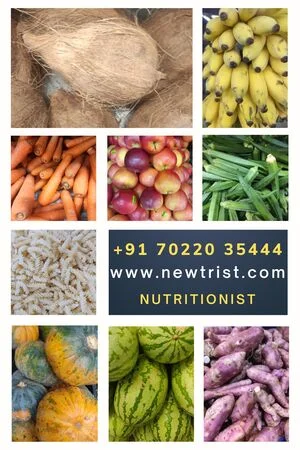Newtrist Nutritionist Pemphigus Vulgaris Diet Plan consists of soft fruits, vegetables cooked to a mushy consistency, shredded and pureed meats, custards, puddings, smoothies, and oatmeal. Eggs may be consumed in the form of scrambled, omelets, and egg salads.
- Early morning drink @ 6:30 am: Coconut water with coconut flesh
- Breakfast @ 9 am: Wheat flour banana pancakes with stewed apple
- Mid-morning meal @ 11 am: Vanilla custard
- Lunch @ 1 pm: Bisbela bath with soft-cooked vegetables
- Evening snack @ 4 pm: Shredded chicken soup (Less spicy)
- Dinner @ 7 pm: Cheese pasta with cottage cheese and grated carrot
Consult 19 years experienced Chief Nutritionist Vasanthi for expert advice and a personalized diet plan. In-person consultation at HSR, Koramangala, Bellandur, Haralur, and video consultation across India.
- Consultation INR 750
- 1 Week personalized diet plan INR 2000
- 1 Month personalized diet plan INR 4000
- 3 Months personalized diet plan INR 9000

Table of Contents
What is Pemphigus Vulgaris?
Pemphigus Vulgaris is a rare skin condition that causes blisters and sores on the mucosal membrane of the mouth or genitals. The disease is characterized by the formation of red or white bumps filled with fluid that break open and cause pain. Pemphigus vulgaris can affect people of all ages but is most commonly seen in middle-aged or older people.
Pemphigus vulgaris is a non-contagious disease caused due to an autoimmune reaction produced by the body which produces antibodies that causes damage to the mucous membranes and cells of the skin.
Blisters in the mouth may cause deficiencies of vital nutrients as it causes difficulty in eating and swallowing food. Proper treatment with medication is required to control the aggravation of the symptoms. Blisters may arise with various skin disorders, hence it may be not easy to diagnose the condition.
An experienced dermatologist may analyze your medical history and perform blood tests, skin biopsy, and endoscopy to confirm the disease. Treatment involves the prescription of oral and topical corticosteroid creams and pills, and immunosuppressant medicines to calm down the immune reaction produced by the body.
What are the symptoms of Pemphigus Vulgaris?
The symptoms of Pemphigus Vulgaris include
- Red or white blisters
- Pain in and around the blisters
- Irritation and discomfort
- Tender skin that easily breaks open upon rubbing
- Sores with a crusty appearance
- Itchiness.
The blisters may undergo infections which may lead to the formation of yellow or white pus which oozes out of the skin when it breaks. Swelling and delayed healing can make the person feel uncomfortable. The person may experience pain and a burning sensation in the affected area.
What are the types of Pemphigus Vulgaris?
The different types of Pemphigus are
- Pemphigus vegetans
- Drug-induced pemphigus
- Pemphigus erythematosus (Senear-Usher syndrome)
- Pemphigus foliaceus
- Endemic pemphigus
- Paraneoplastic pemphigus
Pemphigus Vulgaris Diet Plan
Pemphigus Vulgaris Diet Plan consists of soft foods that are easy to chew and swallow. A variety of foods need to be included in the diet to manage malnutrition, wound healing, and the body’s ability to fight infection.
- Early morning drink @ 6:30 am: Apple sauce
- Breakfast @ 9 am: Thick ragi porridge
- Mid-morning meal @ 11 am: Coconut milk pudding
- Lunch @ 1 pm: Steamed fish in banana leaves and veggie omelet
- Evening snack @ 4 pm: Cantaloupe bowl with cottage cheese
- Dinner @ 7 pm: Dal khichdi with mashed vegetables

Foods to avoid with Pemphigus Vulgaris
Certain foods cause severe pain and discomfort to patients with Pemphigus Vulgaris. Foods to avoid with Pemphigus Vulgaris are
- Hard and crispy foods such as potato chips, crackers, fried foods, and popcorn
- Hot beverages
- Citrus fruits
- Fruit juices of oranges, mangoes, grapefruit, and tomatoes
- Nuts
- Avocados
- Cauliflower
- Eggplant
- Ginger
- Spicy and tangy sauces
- Tomatoes
- Coffee and tea
- Chilies
- Garlic and onions
- Pizza
- Tortilla chips
- Horseradish
- Pickles
- Chocolates
- Pretzels and bagels
Reactions towards foods may vary from person to person. A specific food may negatively affect a person’s health whereas the same food may go well with another person. Maintaining a food journal may help you to choose/omit foods that affect your health condition.
Improvements in the blisters and other symptoms may be noticed with the elimination of certain foods. some people may find it extremely difficult to consume any food where a liquid diet and soft foods may help.
Best vegetables for Pemphigus Vulgaris
The best vegetables for Pemphigus Vulgaris are
- Carrots
- Beetroot
- Sweet potatoes
- Pumpkin
- Ash gourd
- Ladies finger
Ensure the vegetables are cooked to a soft and mushy consistency that is easy to chew and swallow. Make a puree of the vegetables to include a variety of vegetables to avoid deficiency of vital nutrients.
Avoid consuming raw vegetables and greens that have a crunchy texture such as carrots, cucumbers, spinach, lettuce, cabbage, and radishes.
Best fruits for Pemphigus Vulgaris
Here is the list of fruits for Pemphigus Vulgaris
- Apple (Stewed or applesauce)
- Watermelon
- Honeydew
- Ice apples
- Coconut
Tips for Pemphigus Vulgaris
Some of the useful tips to manage Pemphigus vulgaris are
- Maintain good oral and skin hygiene. Use water or peroxide to clean your mouth to get rid of food particles from the oral cavity and promote healing
- Use a soft-bristled toothbrush that doesn’t hurt your blisters
- Use a painkiller before brushing and consuming any food to reduce pain when eating food
- Pick bland and soft foods that make you comfortable to eat and avoid chunky foods and raw vegetables
- Moisten hard and crispy foods by soaking them in gravies until it becomes soft making them easier for chewing and swallowing
- Drink fluids to alleviate swallowing difficulties
- Split your large meals into small meals at frequent intervals to make sure all the vital nutrients are available to the body
- Refrain from consuming steaming-hot foods and beverages such as tea, coffee, hot soups, and beverages
- Consult with your dermatologist and our expert nutritionists for assistance with food and lifestyle
- Avoid spicy and acidic foods that may irritate the blisters
- Limit outside food as it may contain too much sauce and spices that irritate the blisters
- Be patient as the recovery of Pemphigus Vulgaris may take time to get under control
- Avoid stress and causing injury to the skin.

Foods to prevent Pemphigus Vulgaris
Pemphigus Vulgaris is an autoimmune disease caused due to the production of antibodies by the body’s immune system. Foods may help in the management of the symptoms but no particular food can prevent the prevalence of the condition. Restriction of certain foods might reduce the aggravation of the symptoms of the disease.
Pemphigus Vulgaris FAQs
Is Pemphigus Vulgaris curable?
Pemphigus vulgaris cannot be completely cured but treatment can help in the management of the blisters and lesions. Restrictions of citrus foods and spicy foods and treatment with corticosteroid ointments and pills can help with the disease. Pemphigus vulgaris is a chronic condition hence the chances of the recurrence of the symptoms is possible.
What are the best foods to eat for Pemphigus Vulgaris?
Fruits (Non-citrus) and vegetables cooked to perfection to a soft and mushy consistency are perfect for a person with Pemphigus Vulgaris. Puddings, custards, and smoothies can be included in the diet for a nutritious meal. Meat can be consumed in minced and shredded forms cooked with minimum spice and salt.
Eggs can be included unless they are deep-fried in oil. Avoid hard and crunchy foods that may hurt the blisters and lesions in the mouth.
What is the natural remedy for Pemphigus Vulgaris?
Limitations of certain foods in the diet and maintenance of good oral hygiene may prove to be a natural remedy for Pemphigus Vulgaris. Steer clear of citrus fruits such as oranges, lemons, grapefruits, kiwis, and berries, spicy foods, piping-hot beverages such as tea, coffee, and hot chocolate drinks, hard and crispy foods such as potato chips, pretzels, and savories which can prevent irritation of the mouth sores.
How can I reduce Pemphigus Vulgaris?
Pemphigus Vulgaris can be reduced with corticosteroids, immunosuppressants, and changes in dietary patterns. Pemphigus vulgaris may take several weeks to months to heal depending upon the severity of the symptoms. Maintenance of good oral health may alleviate the further progression of the formation of new blisters.
Are proteins, vitamins, and calcium good for Pemphigus Vulgaris?
Pemphigus vulgaris can make normal chewing and swallowing difficult which results in malnutrition and deficiency of essential vitamins and minerals. A diet rich in proteins, vitamins, and calcium is required to maintain good health and prevent weight loss.
Include proteins in the form of minced meat, steamed fish, eggs, and soft-cooked beans and lentils. Steam-cook the vegetables to maintain their nutritional value.
What are the first signs of Pemphigus Vulgaris?
Formation of red/white blisters on the inner surface of the mucosal membrane of the mouth, pain and irritation, and sores with a crusty appearance are some of the first signs of Pemphigus Vulgaris. The blisters may also be found in the nose, throat, eyes, and genital region. The blisters in the mouth can make eating and swallowing foods which may lead to nutritional deficiencies.
Is Pemphigus Vulgaris a serious condition?
Pemphigus Vulgaris may not be a serious condition unless it is treated. Pemphigus vulgaris is a rare chronic condition that may lead to malnutrition and weight loss in the long go. The symptoms may appear on the other parts of the body a few months after mouth sores. The doctor may prescribe anesthesia to facilitate comfortable food intake. Avoid spicy and acidic foods as these foods may irritate the blisters.
How can I treat Pemphigus Vulgaris at home?
Pemphigus vulgaris can be treated at home by maintaining good oral hygiene, consuming soft and bland foods, and avoiding the intake of hot and spicy foods. The health care provider may advise to use painkillers to ease pain and irritation. The condition cannot be cured as there are possibilities of recurrence of symptoms after the remission period. Immunosuppressants may suppress the immune reaction caused by the body.
How to reverse Pemphigus Vulgaris?
Pemphigus vulgaris cannot be reversed completely but the symptoms can be managed with the help of corticosteroids and antibiotics. Dietary modifications with the help of our trained nutritionists can help with better living. Manage stress with changes in lifestyle and keep your mouth clean. Avoid toothbrushes with hard bristles that may hurt the blisters.